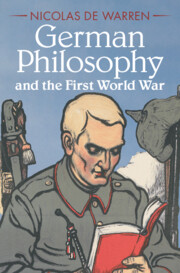Book contents
- German Philosophy and the First World War
- German Philosophy and the First World War
- Copyright page
- Dedication
- Contents
- Acknowledgments
- Introduction
- Chapter 1 The Genius of War, the Genius of Peace
- Chapter 2 Deutschtum und Judentum
- Chapter 3 I and Thou
- Chapter 4 More than Life
- Chapter 5 The Apocalypse of Hope
- Chapter 6 The Road to Damascus in the Age of Capitalism
- Chapter 7 From Death into Life
- Chapter 8 “A Journey around the World”
- Chapter 9 Martin Heidegger and the Titanic Struggle over Being
- Chapter 10 The Tragedy of the Person
- Bibliography
- Index
Chapter 1 - The Genius of War, the Genius of Peace
Max Scheler’s Demons
Published online by Cambridge University Press: 30 March 2023
- German Philosophy and the First World War
- German Philosophy and the First World War
- Copyright page
- Dedication
- Contents
- Acknowledgments
- Introduction
- Chapter 1 The Genius of War, the Genius of Peace
- Chapter 2 Deutschtum und Judentum
- Chapter 3 I and Thou
- Chapter 4 More than Life
- Chapter 5 The Apocalypse of Hope
- Chapter 6 The Road to Damascus in the Age of Capitalism
- Chapter 7 From Death into Life
- Chapter 8 “A Journey around the World”
- Chapter 9 Martin Heidegger and the Titanic Struggle over Being
- Chapter 10 The Tragedy of the Person
- Bibliography
- Index
Summary
On August 25, 1914, three weeks after the invasion of Belgium (August 4) and two months after the fateful assassination of the Archduke Franz Ferdinand and his wife in Sarajevo (June 28), German troops entered the city of Leuven and destroyed its celebrated university library. Some 300,000 books and more than a thousand irreplaceable Medieval manuscripts were burnt along with the torching of 2,000 buildings and the killing of 248 civilians. The devastation was so intense that Dietrich Mahnke, a student of Edmund Husserl’s serving in the 75th Reserve Infantry Regiment, could still observe the city burning on August 27 as his company marched through the village of Korbeek-Lo a few kilometers northwest of Leuven. Outrage among intellectuals, politicians, and the public in Allied nations was swift.
- Type
- Chapter
- Information
- German Philosophy and the First World War , pp. 12 - 46Publisher: Cambridge University PressPrint publication year: 2023

